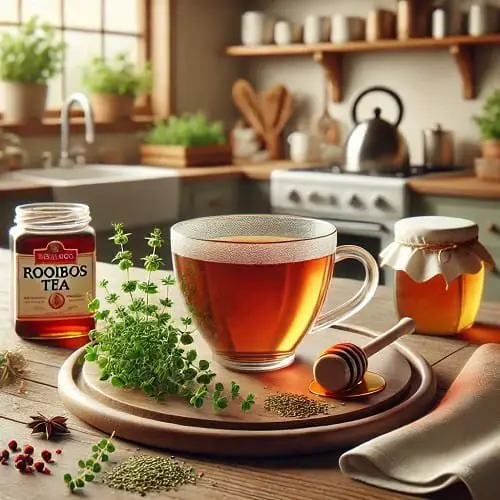Introduction
When it comes to breastfeeding, many mothers are looking for natural and safe ways to support their health and enhance their milk supply. One herbal tea that has gained significant attention among nursing mothers is rooibos tea for breastfeeding. Known for its numerous health benefits, this South African herbal tea is caffeine-free, rich in antioxidants, and has been traditionally used for its calming properties. As more mothers seek natural remedies to improve their well-being during the postpartum period, rooibos tea benefits have made it a popular choice.
In this blog, we will explore the advantages of incorporating rooibos tea for breastfeeding into your daily routine. Whether you’re looking to boost your milk supply, improve digestion, or simply relax, rooibos tea may offer a range of benefits that can help new mothers navigate the challenges of breastfeeding. We’ll also discuss how this tea can provide herbal tea for mothers and why it’s becoming a staple for many women during this important time. Get ready to discover why rooibos tea is making waves in the world of breastfeeding and how it can help you along your journey.
Table of Contents
What is Rooibos Tea?

Rooibos tea is a naturally caffeine-free herbal tea made from the leaves of the Aspalathus linearis plant, which originates in the Western Cape of South Africa. Known as South African tea, rooibos has been cherished by locals for centuries due to its unique flavor and impressive health benefits. Unlike traditional teas such as black or green tea, rooibos tea is not derived from the Camellia sinensis plant, making it an excellent choice for those seeking a caffeine-free alternative.
One of the most remarkable aspects of rooibos tea for breastfeeding is its rich antioxidant content. Rooibos contains powerful antioxidants like aspalathin and nothofagin, which help reduce oxidative stress in the body, support the immune system, and promote overall well-being. These antioxidants also have anti-inflammatory effects, which can benefit breastfeeding mothers who may experience discomfort or fatigue. Additionally, rooibos tea is naturally free from tannins, which are commonly found in other teas and can interfere with nutrient absorption.
Rooibos is also packed with essential minerals such as calcium, magnesium, and iron, which are crucial for maintaining strong bones and overall health. Its calming properties and digestive benefits make it a great choice for those looking for a soothing, health-boosting beverage, especially for new mothers in need of a caffeine-free option.
Why Choose Rooibos Tea for Breastfeeding?

Rooibos tea for breastfeeding offers a range of benefits that make it an excellent choice for nursing moms. Many new mothers seek natural ways to support their bodies and enhance their milk supply, and rooibos tea can be a valuable addition to their breastfeeding routine. One of the key breastfeeding benefits of rooibos tea is its ability to help promote milk production. While not a guaranteed remedy, rooibos is often considered a natural milk booster, providing essential nutrients that can support lactation.
What makes rooibos tea particularly beneficial for breastfeeding mothers is its natural composition. Rooibos is rich in minerals like calcium, magnesium, and iron, which are vital for both the mother’s health and the development of the baby. These minerals help nursing moms stay energized and maintain strong bones, which is crucial during the postpartum period. The soothing properties of rooibos also make it a great option for relieving stress, a common challenge for new mothers. The calming effects of rooibos tea can promote relaxation, reducing anxiety and making it easier to rest after feeding sessions.
In addition to promoting milk production and offering stress relief, rooibos tea aids digestion. Many nursing mothers experience digestive issues during the early stages of breastfeeding, and rooibos can provide a natural remedy. Its gentle, soothing nature helps to alleviate bloating and discomfort, making it a beneficial option for both moms and babies.
Overall, rooibos tea for breastfeeding is a safe and effective herbal solution that offers multiple advantages for nursing moms, from supporting lactation to improving digestion and promoting relaxation. Whether you’re looking for a natural way to boost your milk supply or simply unwind after a long day, rooibos is a great choice.
Health Benefits of Rooibos Tea for Nursing Mothers
Rooibos tea for breastfeeding is not only a comforting and flavorful beverage but also offers several health benefits that can significantly improve the well-being of nursing mothers. One of the primary reasons why many mothers turn to rooibos is its powerful rooibos antioxidants, such as aspalathin and nothofagin. These antioxidants help protect the body from oxidative stress, which is crucial for overall breastfeeding health. Oxidative stress can impair immune function and contribute to inflammation, so the antioxidants in rooibos can provide much-needed relief by reducing these harmful effects and supporting a healthy immune system.
For new mothers, maintaining a strong immune system is essential, especially as they recover from childbirth and adjust to the demands of breastfeeding. Rooibos tea for breastfeeding offers natural, immune-boosting properties that help fortify the body against common illnesses, such as colds and infections. Its high levels of antioxidants also support skin health, which is important for mothers dealing with hormonal changes postpartum.
Beyond immune support, rooibos tea is well-known for its soothing tea qualities. Nursing mothers often experience stress, fatigue, and emotional strain, and rooibos can play a crucial role in reducing these symptoms. The calming effect of rooibos helps lower cortisol levels, the body’s stress hormone, promoting relaxation and improving sleep quality. This is particularly important for boosting milk supply, as stress can inhibit lactation. By reducing stress, rooibos helps create a more conducive environment for milk production and overall maternal health.
Moreover, rooibos tea has anti-inflammatory properties that can reduce discomfort in the body, easing symptoms like joint pain or digestive issues, which many mothers face during the postpartum period. Its gentle nature and calming effects make it a wonderful, natural choice for supporting the health of nursing mothers while offering relaxation and digestive relief.
Overall, rooibos tea for breastfeeding provides multiple health benefits that enhance breastfeeding health by supporting immunity, reducing stress, and promoting overall well-being. It’s a perfect beverage for mothers seeking a natural way to nourish their body during the demanding early months of motherhood.
How Rooibos Tea Affects Breast Milk

Rooibos tea for breastfeeding is widely regarded for its potential to support lactation and breast milk production. While not a direct stimulant of milk flow like some other herbs, rooibos tea can be an essential part of a natural regimen to support breastfeeding. One of the key reasons why rooibos is beneficial for nursing mothers is its nutrient-rich composition, which includes important minerals like calcium, magnesium, and iron, which support overall maternal health. This in turn can help ensure that the body is functioning at its best for producing milk.
Though scientific studies specifically on rooibos tea for breastfeeding and its effects on milk supply are limited, many mothers have shared anecdotal evidence of its positive impact on lactation. The calming and anti-inflammatory properties of rooibos can help reduce stress, which is one of the factors that can negatively affect milk production. By helping to regulate stress hormones and promote relaxation, rooibos supports a better environment for milk-boosting teas to work. This reduction in stress is crucial for nursing support, as a relaxed mother is more likely to experience an adequate milk supply.
Additionally, rooibos is often combined with other herbal remedies for milk supply, such as fenugreek or fennel. These herbs are commonly used alongside rooibos to create a more powerful tea blend that promotes breast milk production. Fenugreek, in particular, is known for its ability to increase lactation, and when paired with rooibos, it can enhance the overall effectiveness of a breastfeeding regimen.
In conclusion, while rooibos tea for breastfeeding may not directly increase milk supply, its calming effects and overall nutrient profile make it an excellent choice for mothers looking to support lactation and ensure a healthy milk flow. When combined with other herbs, rooibos can be part of a natural and soothing solution for mothers seeking to boost breast milk production.
ALSO READ
Is it safe to drink kombucha while breastfeeding?
Can You Take Pre-Workout While Breastfeeding Safely
Can You Take Collagen While Breastfeeding
Is Rooibos Tea Safe for Breastfeeding Mothers?

When it comes to breastfeeding safety, new mothers often have questions about the safety of various foods and beverages, including herbal teas like rooibos tea for breastfeeding. The good news is that rooibos is widely considered safe for both mothers and babies, making it a great option for safe tea for lactating mothers. As rooibos is naturally caffeine-free, it poses no risk of interfering with sleep patterns, which is particularly important for newborns. Furthermore, its gentle, soothing properties make it an ideal choice for new mothers who need to unwind without worrying about any harmful effects on their baby.
However, as with any herbal remedy, it’s important to be aware of potential rooibos side effects. While rooibos is generally well-tolerated, some individuals may experience mild allergic reactions or digestive upset. It’s always advisable to start with small amounts to monitor how your body responds. If you experience any adverse effects, such as rashes or gastrointestinal issues, it’s best to discontinue use and consult a healthcare professional.
Additionally, herbal tea safety is crucial, especially for breastfeeding mothers, as the body can react differently to herbs than it does to food. While rooibos itself is considered safe, moderation is key. Drinking one to two cups of rooibos tea a day is typically sufficient to enjoy its benefits without overconsumption.
Rooibos has no known harmful interactions with breast milk, and the nutrients it provides, such as calcium and magnesium, can be beneficial for both mother and baby. As long as you consume it in moderation, rooibos tea for breastfeeding remains a safe and nourishing choice that promotes overall health and well-being.
In summary, rooibos tea for breastfeeding is safe for most mothers, offering a soothing and nutritious option to support breastfeeding without the risks associated with caffeine.
How to Brew Rooibos Tea for Maximum Benefits

Brewing rooibos tea for breastfeeding is a simple process, but knowing the right techniques can help you extract the most flavor and health benefits. Here’s a step-by-step guide to ensure you’re getting the most out of your rooibos tea preparation.
- Boil water: Start by boiling fresh water. Rooibos tea requires hot water to fully release its flavors and antioxidants.
- Measure the tea: For each cup of tea, use 1 to 1.5 teaspoons of loose leaf rooibos tea or one rooibos tea bag. This provides the perfect balance of flavor and nutrients.
- Steep: Pour the boiling water over the tea leaves or tea bag, ensuring it’s fully submerged. Allow the tea to steep for about 5 to 7 minutes for a full-bodied, rich flavor. If you prefer a stronger tea, you can let it steep for an additional minute or two.
- Strain and Serve: If you’re using loose leaves, strain the tea before drinking. You can serve the tea hot or cold, depending on your preference.
To make making rooibos tea more enjoyable, consider adding a natural sweetener like honey or a splash of milk for creaminess. You can also infuse the tea with flavors like lemon or vanilla for extra taste. Rooibos is naturally sweet, so you may not need much to enhance its flavor.
For best tea for breastfeeding, drink one to two cups of rooibos tea a day, ideally between meals to prevent any potential impact on nutrient absorption. You can also enjoy a cup in the evening to help wind down before bedtime, as its calming effects support relaxation and sleep.
By following these tea brewing methods, you can enjoy all the benefits of rooibos tea while maintaining a delicious, soothing ritual that supports your health during breastfeeding.
Frequently Asked Questions About Rooibos Tea and Breastfeeding
Is rooibos tea for breastfeeding safe for my baby?
Yes, rooibos tea for breastfeeding is considered safe for both mothers and babies. It is caffeine-free, making it a great alternative to regular tea, and it contains antioxidants and minerals that benefit the mother’s health. It does not affect breast milk or cause any harm to your baby.
How much rooibos tea should I drink while breastfeeding?
It is generally safe to consume one to two cups of rooibos tea per day. Drinking rooibos tea in moderation is ideal. Avoid excessive consumption to ensure that you are not over-consuming any herbal compound.
Can rooibos tea help boost milk supply?
While rooibos tea itself may not be a direct stimulant for milk production, its calming properties can reduce stress, which is known to support lactation. Some mothers also combine it with other herbal teas for lactation for a more potent effect.
Are there any side effects or allergies to rooibos tea?
Rooibos side effects are rare, but some people may experience mild digestive discomfort or allergic reactions. It is always a good idea to start with a small amount and monitor your body’s response. If you experience any negative reactions, discontinue use and consult a healthcare professional.
When is the best time to drink rooibos tea?
You can drink rooibos tea for breastfeeding at any time of the day. Many mothers enjoy it in the evening as its relaxing properties can help with sleep. It can also be consumed between meals to avoid interfering with nutrient absorption.
Conclusion
Incorporating rooibos tea for breastfeeding into your daily routine can offer numerous benefits for both mothers and babies. The benefits of rooibos tea include promoting relaxation, aiding digestion, and providing essential nutrients that support both lactation and overall health. With its lactation support properties and gentle, soothing nature, rooibos is an excellent choice for mothers seeking a natural, safe tea for breastfeeding. By drinking rooibos tea as part of a healthy breastfeeding diet, you can enjoy a comforting beverage that supports your well-being and your baby’s health. If you’re looking for a safe, nourishing, and calming drink during your breastfeeding journey, rooibos tea is certainly worth a try.






